Alberta to explore leaving CPP as report lays claim to $334B, more than half of fund
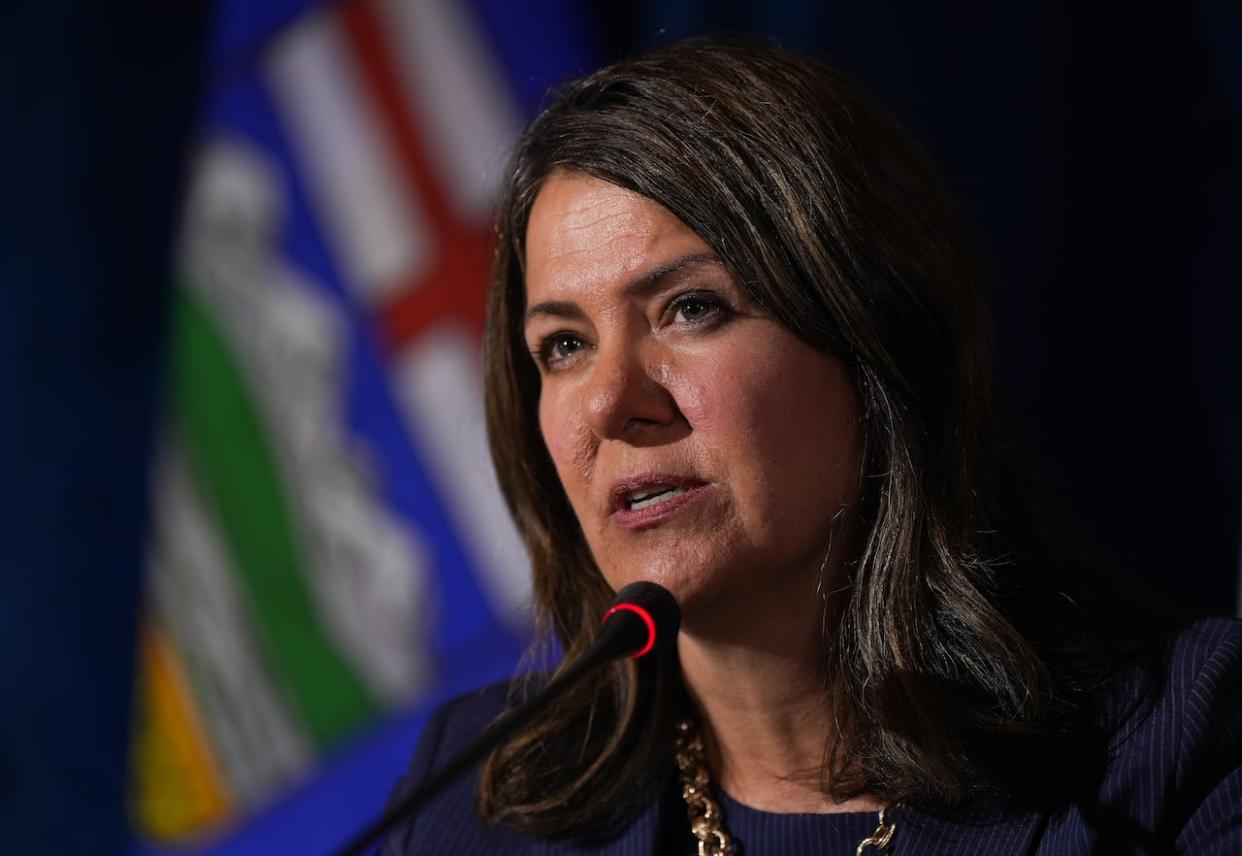
The Alberta government released a long-awaited report Thursday on the possibility of establishing an Alberta-only pension plan, claiming the province is entitled to a staggering $334-billion asset transfer from the Canada Pension Plan in 2027.
That's more than half of the fund's estimated total net assets. The third-party report, compiled by consultant LifeWorks, attributes the figure to Alberta's high employment rates, young population, and higher pensionable earnings, which it claims has meant the province has sent billions more into the CPP compared to what it has received.
Withdrawing from the CPP could potentially mean the rest of the country would end up paying more for their pension contributions (though Trevor Tombe, an associate professor of economics at the University of Calgary, said it's not mechanically guaranteed). Quebec would not be affected, as it has operated its own pension plan for decades.
"I believe that an Alberta pension plan would be fairer and could make life more affordable for all Albertans," Alberta Premier Danielle Smith said during a press conference. The report estimates the move would save $5 billion in the first year.
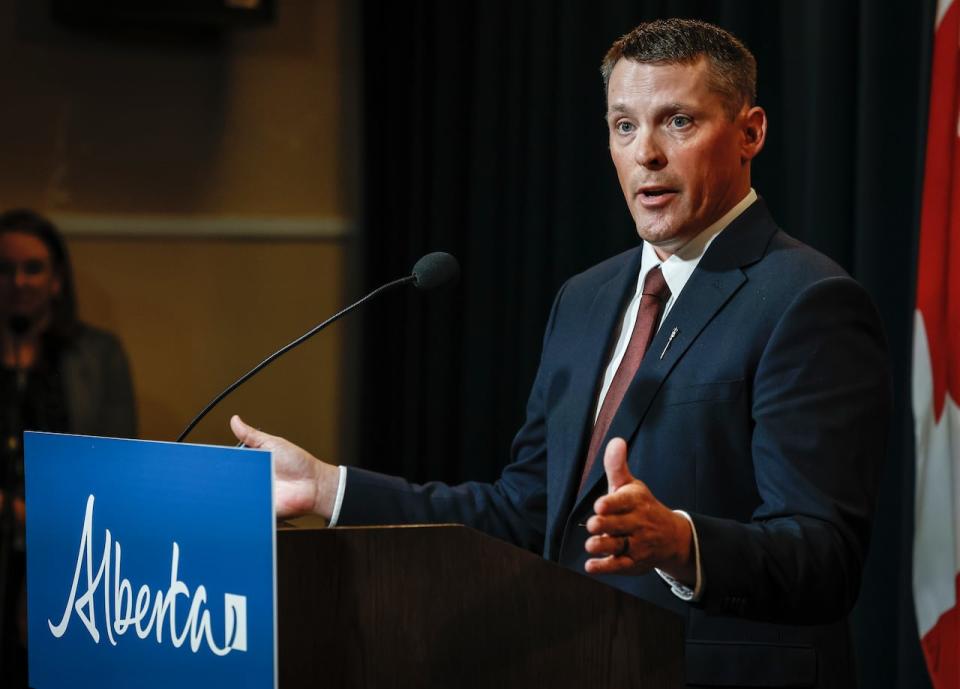
Alberta Finance Minister Nate Horner, pictured here in a file photo, spoke to media on Thursday about the possibility of establishing an Alberta-only pension plan. (Jeff McIntosh/The Canadian Press)
To withdraw from the CPP, Alberta would need to provide written notice that it planned to do so and draft legislation to establish an Alberta pension plan. It would need to accept contributions beginning in the third year following the year in which it gives notice, and then provide comparable benefits to the CPP.
The government is quick to note that such a plan to withdraw from the CPP is still in the early, hypothetical stages. Now that it's been released, the next few months will see former Progressive Conservative finance minister Jim Dinning head up a panel that will consult with Albertans on the idea over the fall and into spring 2024. If those go well, the government says it could then hold a referendum.
During an unrelated press conference on Thursday, federal Finance Minister Chrystia Freeland was asked about Alberta's announcement. Freeland said she had yet to read the details of the announcement and would refrain from commenting directly, but did defend the CPP.
"The CPP, I think, is one of the crown jewels of Canada. The CPP ensures that our parents and all of us can have a safe and dignified retirement. It is a source of a huge amount of security for every single Canadian," Freeland said.
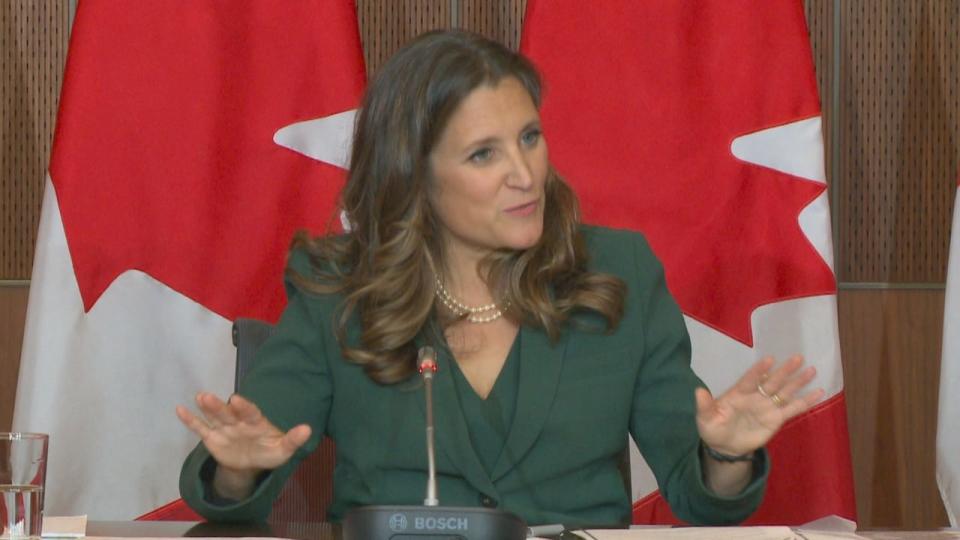
Finance Minister Chystia Freeland said she had yet to read the details of Alberta's report, but defended the fundamental ideas behind the Canada Pension Plan on Thursday. (CBC News)
Disagreements over interpretation
Over the coming days and weeks, expect questions about the report's assumptions around how much Alberta would be entitled to, which it states are based on how much Alberta has contributed to the CPP, minus what they've received in benefits since the start of the CPP in 1966, plus investment earnings on that amount.
Tombe, at the University of Calgary, said that what the government released in its report today was a "very problematic" interpretation of the act.
"[It] basically puts Alberta into the position that it would have been in had it never joined in the first place. But that's not a reasonable read," said Tombe.
"What we need to do is divide the existing assets, not construct a hypothetical amount of assets that we could have had if the world had been different from the 1960s onwards. So that's hugely important."
Tombe said a more reasonable interpretation lands not at over half of CPP assets, but somewhere potentially around 20 per cent of CPP assets, or at the highest, 25 per cent.
Asked about that on Thursday, Alberta Finance Minister Nate Horner, who joined Premier Smith at the press conference, stood by the report.
"We're using the best information we have. That's what LifeWorks has used and we stand by the validity of ... their interpretation and methodology," Horner said.
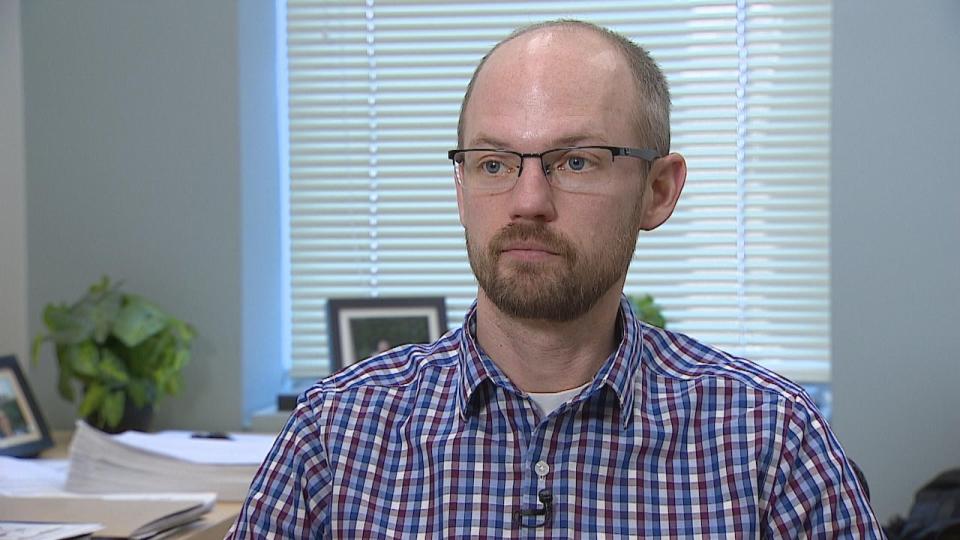
Trevor Tombe is an associate professor of economics at the University of Calgary. He said it was problematic that the Alberta government was hanging its hat on half of the CPP's assets, which he called "transparently unreasonable." (Erin Collins/CBC)
Tombe also released an analysis on the possibility of an Alberta pension plan on Thursday.
"There is also a practical problem to consider. If British Columbia, Alberta, and Ontario each withdrew from the CPP, for example, I estimate 128 per cent of assets would need to be paid," Tombe writes.
Tombe expanded on that in an email to CBC News, writing that his view is that LifeWorks' interpretation of the formula that is laid out in the act is not a reasonable one.
"It isn't completely insane, to be clear, and was a reasonable interpretation shared by some in 1965 when the act was passed," Tombe wrote.
"But in the modern CPP it is no longer a practical interpretation … the problem is that the language is vague. It is not at all clear which of several potential interpretations is the correct one. My own analysis suggests 20 to 25 per cent of the CPP assets reflects a reasonable interpretation. Ultimately, the Supreme Court will need to decide. Claims that there is a simple formula that just needs to be applied are false, in my view."
Over the coming days and weeks, also expect questions around how the report interprets portions of the Canada Pension Plan Act related to withdrawal. The government expects those questions, along with others, will be hotly debated over the coming weeks and months.
This report emerged out of the "Fair Deal" panel report, a series of proposed measures that former premier Jason Kenney said would help the province carve out a stronger position for itself within Confederation, the pension part of that equation being the clear crown jewel. After being shelved for a time, Alberta Premier Danielle Smith tasked President of Treasury Board and Minister of Finance Nate Horner with releasing it as a part of his mandate letter in July.
Dinning himself noted in a news release Thursday that he expects that conversations around the plan could get "fiery" at times. Polling has suggested that the majority of Albertans aren't on board with the idea.
Tombe, the U of C professor, said the single most important variable determining the future of a separate Alberta plan are the assets that they would get from the CPP.
"This is not something that's just arbitrarily negotiated between Alberta and the rest of the country. It's something that has a formula defined in the Canada Pension Plan," Tombe said, who added there is some ambiguity in some of the critical language in the act.
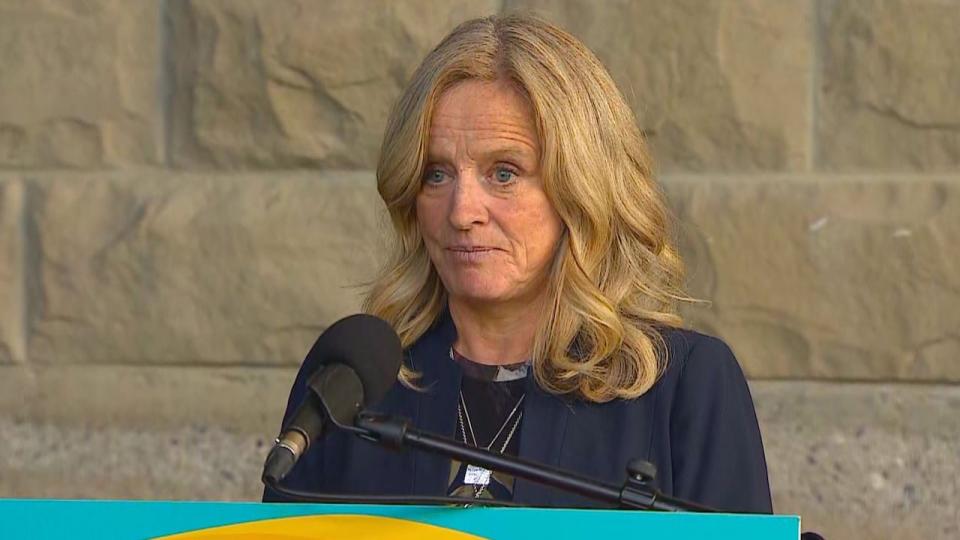
Alberta NDP Leader Rachel Notley told Albertans, "in short, your pension is not safe," during a press event held Thursday. (CBC News)
During a press event held later Thursday, Alberta NDP Leader Rachel Notley claimed that the report was "riddled with fake numbers."
"She now plans to spend your money campaigning to convince you it's a good idea. It's not. In short, your pension is not safe," she said.
"The report today, that I briefly had a chance to review, reads like it's too good to be true. And of course, that's because it is."
Smith has long been floating trial balloons around a potential Alberta pension plan, campaigning on the idea during her leadership campaign but holding them back during her provincial election campaign. But Alberta's role in Canada's pension landscape has often been wielded as a possible political wedge when deliberations with Ottawa melt down.
The Fair Deal panel, of course, explicitly plotted out that strategy, and the 2001 "firewall letter," penned by Stephen Harper, then with the National Citizens' Coalition, among others, also uses pensions as a potential bargaining chip when it comes to battles over grievances with former prime minister Jean Chrétien.
"We believe the time has come for Albertans to take greater charge of our own future. This means resuming control of the powers that we possess under the Constitution of Canada but that we have allowed the federal government to exercise," the letter reads, suggesting that the province withdraw from the CPP to create an Alberta pension plan.


